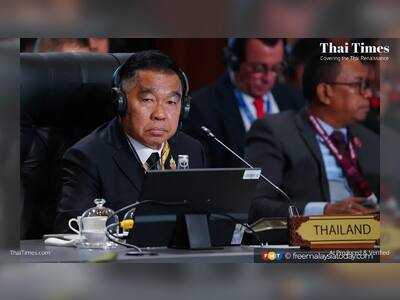Thai Landslide in Betong: A Harbinger of Climate-Driven Urban Challenges?
The recent landslide highlights vulnerabilities in urban infrastructure amidst a backdrop of increasing climate anomalies.
A landslide in Betong, a town nestled in southern Thailand, has brought to the fore significant challenges facing urban centers amid the volatile backdrop of climate change.
Following days of relentless rain, the Betong municipal office's car park was severely damaged, yet miraculously, there were no reported injuries.
This incident, however, is emblematic of a broader, troubling pattern.
As climate change accelerates, extreme weather events are rapidly becoming the norm rather than the exception.
The increasing frequency of such events calls into question existing urban planning and disaster preparedness strategies.
While it's tempting to attribute each incident solely to shifting climate patterns, the issue is more complex.
Local resource management plays a critical role in mitigating the impact of these natural disasters.
The adequacy of drainage systems and the robustness of infrastructure are often deciding factors in a city's resilience to such events.
However, a nuanced analysis suggests that local solutions, while necessary, may be insufficient if they aren't aligned with a broader understanding of climate trends.
Ignoring the overarching threat of climate change risks relegating disaster response efforts to mere patches rather than addressing root causes.
The recent rise in both frequency and intensity of weather-related events worldwide underscores the urgency of this challenge.
Economically, regions like Betong often face financial constraints that hinder the development of adequate infrastructure.
While immediate funding can address urgent infrastructural repairs, a long-term strategy that includes comprehensive climate education, international collaboration, and investment in resilient structures is imperative.
A holistic approach is essential, one that encourages collaboration between individuals, governmental bodies, and international entities.
As Margaret Mead once observed, 'Never doubt that a small group of thoughtful, committed citizens can change the world.' This sentiment is increasingly relevant, imploring citizens across the globe to engage deeply and advocate for meaningful change.
It is this kind of collective commitment that can help ensure incidents like the Betong landslide become increasingly rare in the future.
Following days of relentless rain, the Betong municipal office's car park was severely damaged, yet miraculously, there were no reported injuries.
This incident, however, is emblematic of a broader, troubling pattern.
As climate change accelerates, extreme weather events are rapidly becoming the norm rather than the exception.
The increasing frequency of such events calls into question existing urban planning and disaster preparedness strategies.
While it's tempting to attribute each incident solely to shifting climate patterns, the issue is more complex.
Local resource management plays a critical role in mitigating the impact of these natural disasters.
The adequacy of drainage systems and the robustness of infrastructure are often deciding factors in a city's resilience to such events.
However, a nuanced analysis suggests that local solutions, while necessary, may be insufficient if they aren't aligned with a broader understanding of climate trends.
Ignoring the overarching threat of climate change risks relegating disaster response efforts to mere patches rather than addressing root causes.
The recent rise in both frequency and intensity of weather-related events worldwide underscores the urgency of this challenge.
Economically, regions like Betong often face financial constraints that hinder the development of adequate infrastructure.
While immediate funding can address urgent infrastructural repairs, a long-term strategy that includes comprehensive climate education, international collaboration, and investment in resilient structures is imperative.
A holistic approach is essential, one that encourages collaboration between individuals, governmental bodies, and international entities.
As Margaret Mead once observed, 'Never doubt that a small group of thoughtful, committed citizens can change the world.' This sentiment is increasingly relevant, imploring citizens across the globe to engage deeply and advocate for meaningful change.
It is this kind of collective commitment that can help ensure incidents like the Betong landslide become increasingly rare in the future.











